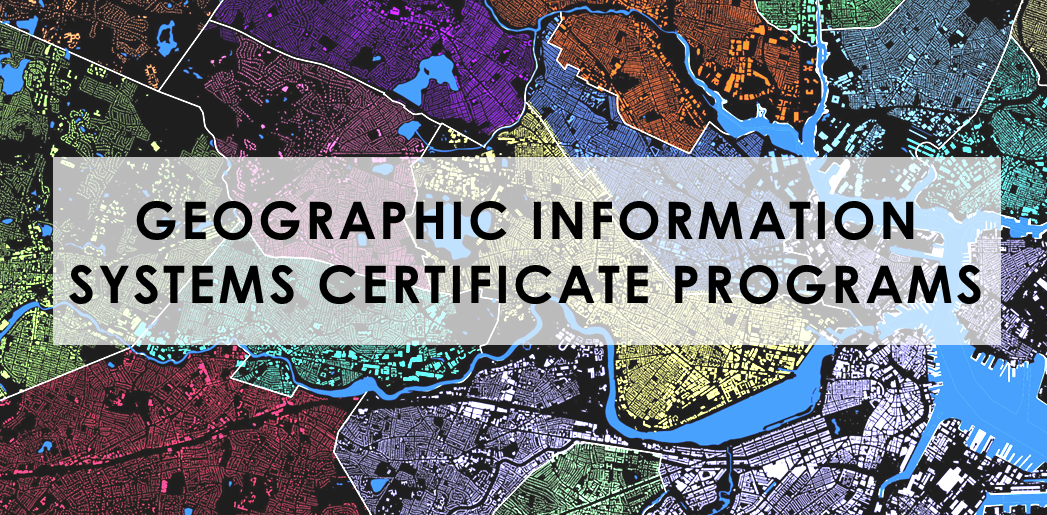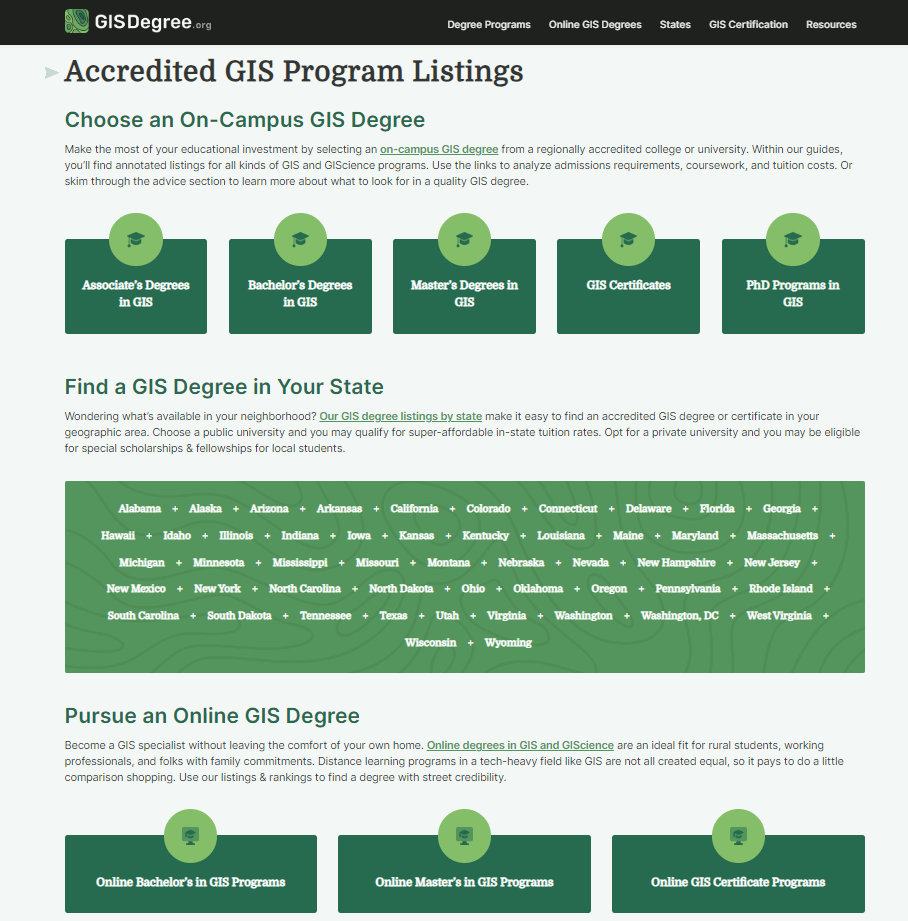
There are many different types of GIS certificates, certifications, and degrees available for students today.
This page includes information on the Geospatial Certificates offered at Tufts through the department of Urban & Environmental Policy & Planning (UEP), along with additional programs and certificates to consider while learning GIS or applying for careers in the industry.
Tufts Geospatial Certificates
The Department of Urban and Environmental Policy and Planning (UEP) offers two multidisciplinary certificates in spatial sciences to both Tufts matriculated graduate students in Arts & Sciences and non-matriculated post-baccalaureate students.
Students choose between 2 different tracks:
1. Geographic Information Science (GIScience)
Geographic Information Science GIScience focuses on principals of Geographic Information Science, spatial analysis, spatial data management, and cartographic design.
This certificate will help you prepare for a career in GIS technology in a variety of professional industries or research domains including environmental studies, urban studies, public health, and more.
[expand title=”▸ Course Requirements” tag=”h6″ swaptitle=”▾ Course Requirements” targclass=’graybackground’]
The certificate requires twelve credits. Most courses are three credits.
Two required courses (6 credits):
– Introduction to GIS or approved
– Intro to GIS course equivalent
– Advanced GIS
Two electives from the following (3 credits):
– Qualitative GIS
– Intro to Remote Sensing
– Advanced Remote Sensing
– Spatial Statistics
– Interactive Web Mapping
One graduate-level statistical or quantitative methods course
Thesis or capstone with core spatial methods pending approval of GIS certificate coordinator
Other courses may be approved by the coordinator if they have a core spatial component.
[/expand]
2. Spatial Data Analytics
Spatial data science/analytics focuses on spatial statistical analysis, geospatial modeling and visualization. This certificate includes advanced coding and statistical methods.
The Certificate in Spatial Data Analytics focuses on spatial statistics, modeling, visualization techniques, and web mapping, and is complimentary to broader data science applications.
[expand title=”▸ Course Requirements” tag=”h6″ swaptitle=”▾ Course Requirements” targclass=’graybackground’]
The certificate requires twelve-thirteen credits. Most courses are three credits.
Prerequisites: Intro to Statistics
Three required courses (9 credits):
– Introduction to GIS or approved intro GIS Course equivalent
– Advanced GIS
– Urban Analytics and Visualization OR Data Science for Urban Sustainability (both require a previous introductory course in Python or the new 1 SHU “Introduction to Programming with Python” course at Tufts, offered in both Spring and Fall)
One elective from the following (3 credits):
– Intro to Remote Sensing
– Advanced Remote Sensing
– Spatial Statistics
– Interactive Web Mapping
– Data Analytics/Data Science elective courses
Approved advanced statistical or quantitative methods course
Thesis or capstone with core spatial methods pending approval of GIS program coordinator
Other courses may be approved by the coordinator if they have a core spatial or data science component
[/expand]
In order to qualify for the certificates, students must complete 4 courses totaling 12 credits in accordance with the respective certificate requirements. The certificate can be completed in 3 to 4 semesters depending upon availability. Courses are offered in a flexible format, including evenings, online, and weekends, making them good for working professionals. Courses must be completed at Tufts University.
As a student in the program, you’ll also have access to Tufts’ Data Labs, full-service computing labs dedicated to geospatial technology, statistics, and data science which serve as a hub for GIS activities at Tufts and are designed to foster collaboration and innovation.
Applications are accepted on a rolling basis.
Faculty contact: For additional information about this certificate, please contact Sumeeta Srinivasan, with the UEP Department at Tufts University.
Resources for Types of GIS Programs & Certificates
There are many different types of geospatial programs for students wanting to learn GIS or prove their skills to future employers. There are two main types of GIS education:
GIS Degrees or GIS certificates offered by accredited college, universities, or academic institutions including bachelors, masters, or certificate degrees.
GIS certifications which serve as verified credentials guaranteeing your expertise and knowledge with using GIS tools and software. These certifications are typically the GISP Certification from The GIS Certification Institute (GISCI) or ESRI certifications, offered by the industry’s leading GIS software provider.
Resources for Finding the Right Degree or Certification for you
GISDegree.org is an excellent resource for learning about different types of programs along with finding the right type of program either on-line or near you. Check out their website to see all the options available to you.
